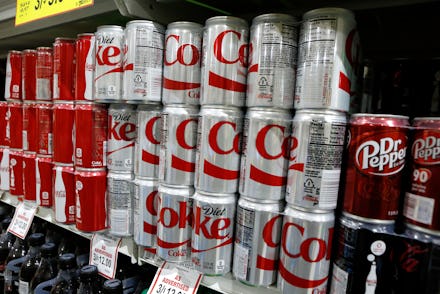Mexico Just Showed the World How to Fight Obesity and Diabetes — And We Should Listen

Two years ago, Mexico implemented a new policy to combat the nation's obesity epidemic: It started taxing soda.
Despite opposition from food and beverage lobbyists, the Mexican government approved the sales tax in 2013. In 2014, it went into effect: a roughly 20% sales tax on all sugar-sweetened beverages.
The tax successfully reduced people's soda purchases, according to an observational study published Wednesday in the BMJ. Within a year, people in Mexico were buying 12% fewer sugar-sweetened beverages. That's not all — within the same period of time, sales of bottled water rose 4%.
Nutritionally, those reductions are too small to have a major impact, Barry Popkin, one of the study's authors, told Mic. But that's OK.
"The point is proof of concept," he said. "It shows the tax works."
The researchers hope their findings will bring the U.S. one step closer to implementing the taxes here. In the U.S., where 34.9% of adults are obese and around 9.3% of the population has diabetes, public health advocates have long been pushing for taxes on sugar-sweetened beverages. In some cases they've been successful — like in Berkeley, California — but for the most part they've been met with opposition.
Dozens of cities and states have tried and failed to implement taxes on sugar-sweetened beverages. San Francisco, despite being geographically and ideologically close to Berkeley, failed to pass a proposed soda tax in 2014. And in Philadelphia, the beverage lobby has repeatedly shut down attempts to institute a soda tax.
It's not just the beverage lobbies fighting the taxes; many ordinary Americans don't want them, either.
"America doesn't have a lot of social consciousness," Popkin said. "It's very much an individualist country, where individuals want to think they can make every decision for themselves." (For proof, look no further than New York City's much-derided, and ultimately unsuccessful, proposed ban on jumbo-size sodas.)
Unfortunately, the prevalence of unhealthy items like cigarettes and soft drinks "increases health costs so much, it affects everybody," Popkin continued.
The taxes, therefore, could have "a huge social effect in our society," he said.
Will taxing soda really make us healthier? Though the numbers aren't huge, there is evidence to suggest that when people are taxed on sugar-sweetened beverages, their consumption of those beverages goes down.
Marc Bellemare, an assistant professor in the department of applied economics at the University of Minnesota, examined data from countries around the world who'd implemented taxes on sugary drinks. His findings showed that "depending on how you parse the data, you could claim anything from no impact to about a 2.6 percent decrease," according to the Washington Post.
Popkin, for his part, claimed "food purchases are completely related to consumption."
If there is, indeed, a link between soda purchases and soda consumption, it stands to say that soda taxes would help Americans drink less of the sugar-loaded beverage (a single can of Coke contains 39 grams of sugar — close to the total amount of sugar the U.S. government recommends you consume in a day).
The less soda we drink, the healthier we'll be; the drink has been linked to a myriad of ailments including obesity, diabetes, and tooth decay. In turn, health costs would be alleviated, too. In 2010, the cost of heart disease in the U.S. was $444 billion. In 2012, the cost of diabetes was $245 billion.
If implemented in the U.S., soda taxes "would be very helpful to the U.S. diabetes, obesity and chronic disease problem," Popkin said.
Marci Clow, a registered dietician nutritionist at Rainbow Light, is all for finding ways to limit Americans' soda intake — but she still isn't convinced a soda tax is the way to do it.
"Although the intention of a U.S. soda tax would be to decrease purchases, and I think it would, it's kind of like taxing of alcohol and cigarettes," she told Mic via email. "If people really want something that they are addicted to they will find a way to get it."
"So by all means, I would vote for taxing the heck out of sodas so as to discourage consumption, but I'm not convinced it is the answer to solving America's obesity rates," she continued.
Whether or not they're ultimately effective, soda taxes could soon be more commonplace. Even before the Mexico study was published, health advocates were using the study's abstract to campaign for sugar-sweetened beverage taxes in a number of cities and counties, Popkin said.
A year from now, he foresees "one to five" counties and cities approving soda taxes.
"There are so many cities and counties bringing this up for votes," he said.
As for a nationwide tax, Popkin isn't ruling out the possibility, but he acknowledges it's going to take some time: "That's going to take decades."